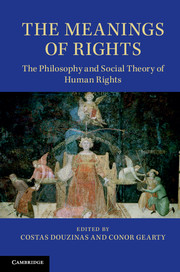Book contents
- Frontmatter
- Contents
- Notes on contributors
- Introduction
- Part I Finding foundations
- Part II Law, rights and revolution
- Part III Rights, justice, politics
- Part IV Rights and power
- 12 Second-generation rights as biopolitical rights
- 13 History, normativity, and rights
- 14 “All of us without exception”: Sartre, Rancière, and the cause of the Other
- 15 However incompletely, human
- 16 Welcome to the “spiritual kingdom of animals”
- Index
- References
13 - History, normativity, and rights
Published online by Cambridge University Press: 05 June 2014
- Frontmatter
- Contents
- Notes on contributors
- Introduction
- Part I Finding foundations
- Part II Law, rights and revolution
- Part III Rights, justice, politics
- Part IV Rights and power
- 12 Second-generation rights as biopolitical rights
- 13 History, normativity, and rights
- 14 “All of us without exception”: Sartre, Rancière, and the cause of the Other
- 15 However incompletely, human
- 16 Welcome to the “spiritual kingdom of animals”
- Index
- References
Summary
Appeals to right have long been an especially potent form of social and political criticism. There is something compelling about defending certain ways of acting or ways of being treated as a matter of right. To say that someone has a right to something is to say that they have a particular kind of entitlement such that others, or governments, are under an obligation to provide it or at least not to prevent their obtaining it. For this reason, the appeal to rights has played an important role in the recent history of minority struggles. Activities and relationships associated with particular forms of life, such as non-European Indigenous ways of life or non-heterosexual relationships, are often defended as rights. This form of argument can be described as a strategy of universalization in the sense that it involves presenting the activities and interests of a particular group as consistent with the activities and interests of the polity as a whole. “Rights arguments do this: they restate the interests of the group as characteristics of all people.”
From a normative and political point of view, the appeal to rights has fallen out of favor for many on the left in recent years. A range of theoretical arguments and pragmatic political considerations has been taken to provide good reasons to abandon “rights-talk” and appeals to rights altogether. I focus on the theoretical arguments below, particularly those drawn from the work of Foucault and Deleuze. I will argue that, in different ways, they provide grounds for an alternative response to the criticism of rights that does not abandon rights altogether, but rather the received view of rights as universal and a-historical. A common thread running through the criticism of rights is acceptance of the universality of rights. Wendy Brown summarizes this received view of the notion of rights in suggesting that:
rights necessarily operate in and as an ahistorical, acultural, acontextual idiom: they claim distance from specific political contexts and historical vicissitudes, and they participate in a discourse of enduring universality rather than provisionality or partiality. Thus, while the measure of their political efficacy requires a high degree of historical and social specificity, rights operate as a political discourse of the general, the generic and universal.
- Type
- Chapter
- Information
- The Meanings of RightsThe Philosophy and Social Theory of Human Rights, pp. 233 - 250Publisher: Cambridge University PressPrint publication year: 2014
References
- 14
- Cited by



